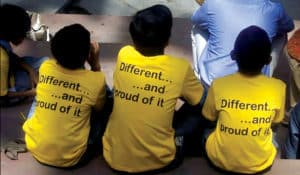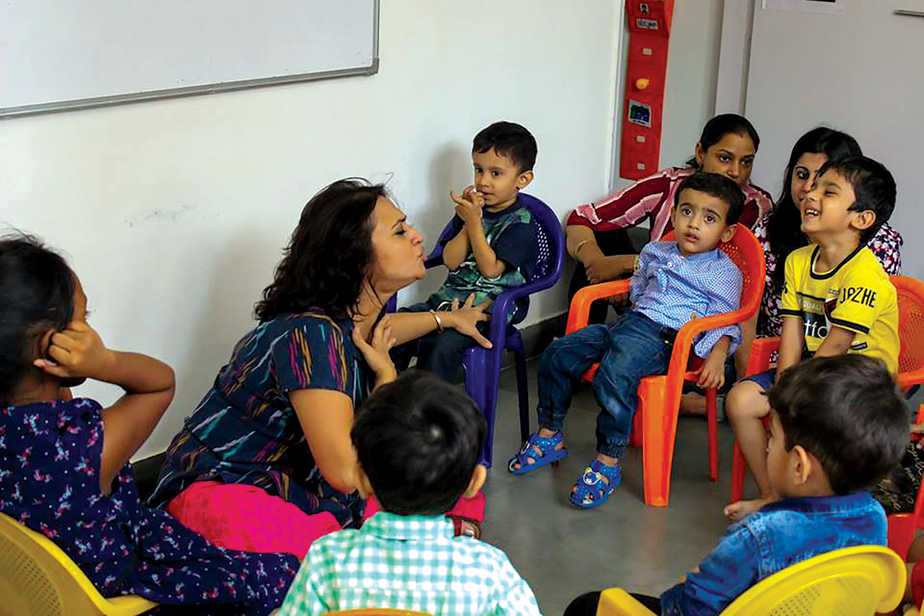There are over 18 million autistic children in India. Patriot caught up with special educators to see how they deal with the societal challenges thrown their way
At the age of five, Merry Barua’s son was diagnosed with autism. Her son is 38 now, and ever since his diagnosis, Barua dedicated her life to studying, teaching, and creating awareness about children with special needs. Barua has been a special educator for over 25 years, she has her own non-profit organisation called Action for Autism, and is known internationally for her work in the field.
Special educators are teachers equipped with the skills and dedicated to educate and train children with disabilities. They are trained in the same and help these children with their school curriculum, which they find difficult to follow in a regular classroom set-up. However, Barua says that it really is not necessary for a special educator to have special training in her field. “All that is required is some patience and sensitivity. I have known many special educators who haven’t had any special training, and yet are so good with the children.”
Srubabati Chatterjee, a special educator for the past 20 years, agrees with Barua that the lives of regular school teachers and those of special educators aren’t very different. The only trait essential for being a special educator is basic sensitivity. “As a society we tend to reject anything that is different. Whether it is an autistic kid, or simply a child who is finding it difficult to follow a certain class. Our attitude is not very inclusive and that needs to change,” she says.

Chatterjee is the head of the Special Education Department in her organisation. They have taken 157 special children under their wing, and currently employ 50 teachers including special educators, speech therapists and counsellors.
According to the amendment to the Right to Education Act in 2012, differently abled children are to be given a chance in all mainstream schools, considering they are comparatively lower on the autism spectrum, so they would be able to follow the curriculum set for mainstream schools. “Delhi is probably one of the states that has a better track record, when it comes to making the education process more inclusive for special children,” says Barua. According to her, most of the new schools are hiring special educators as part of their faculty, while some other schools are still catching up.
She explains that the problem with regular schools and the education system is that teachers do not want to break out of their strict teaching pattern for the benefit of one student. From the very outset there is a belief that children with autism are unwanted. She adds, “I actually know of doctors, who have told brand new parents after the birth of their child, ‘Oh, this one is useless, you should probably conceive another one’ — that’s ridiculous! You’re labelling them at birth!” According to Chatterjee, the school needs to be a more inclusive space, in terms of infrastructure and faculty, “The more they step out and be visible, sensitivity will automatically develop in other people around them.”
Besides the obvious problem of acceptance and insensitivity, special educators are also not paid much. Considering that not too many mainstream schools have a special educator, there are separate centres for children on the spectrum, and the curriculum is set down depending on the degree of their disability.
Some of these schools have a ‘sliding-scale’ policy, which suggests that the parents of the students have to pay for the education based on how much their income is. The more they earn, the more the fee. This can bring down the teachers’ salary significantly. On the other hand, there are also other schools that cater only to those children whose parents can pay a significantly large amount. As can be imagined, this closes avenues for those children on the spectrum who do not have well-to-do parents. “Inclusion of special educators in mainstream schools is definitely a start,” adds Barua as an afterthought.

The other challenge that special educators constantly have to face is of parents in denial. Many parents do not like to admit that their child has a learning disability. They continue to berate them if their performance is not up to the standard set by the children who are not on the spectrum. “The challenge is in getting the parents to accept that their child has special needs,” Chatterjee says.
Children with special needs simply need to be approached a little differently. Most parents are in denial about their child having a special condition. These children are already being held back due to the social stigma around their disability, and it is the job of the special educators to shatter those myths.
Barua recalls a case, where a child was excluded from school outings because she had difficulty with movement. The teachers, instead of finding a way to work around the minor setback, excluded her entirely. These are the practices that need to be stopped.
Special educators have to deal regularly with the culture of intolerance that keeps rearing its ugly head, according to Barua. “Through our movies, we teach that the villain always has some kind of physical problem — he may be cross-eyed or may be walking with a limp. And as a result, a cross-eyed child in a classroom environment would suffer,” she says. The job of a special educator is less of a profession and more of an attitude. They have to be constantly sensitive and considerate, and have to come up with innovative ways to teach children on the spectrum. They have carried the burden of educating children with special needs and helping them blossom, where for the longest time, mainstream schools and most of society has remained oblivious to the toxic environment they themselves create for children with slightly different requirements.
“When we accept children with special needs into mainstream schools, we are not doing them a favour. We are, in fact, doing every other kid a favour. We are teaching them by example, qualities like patience, consideration, diversity and sensitivity,” she concludes.





